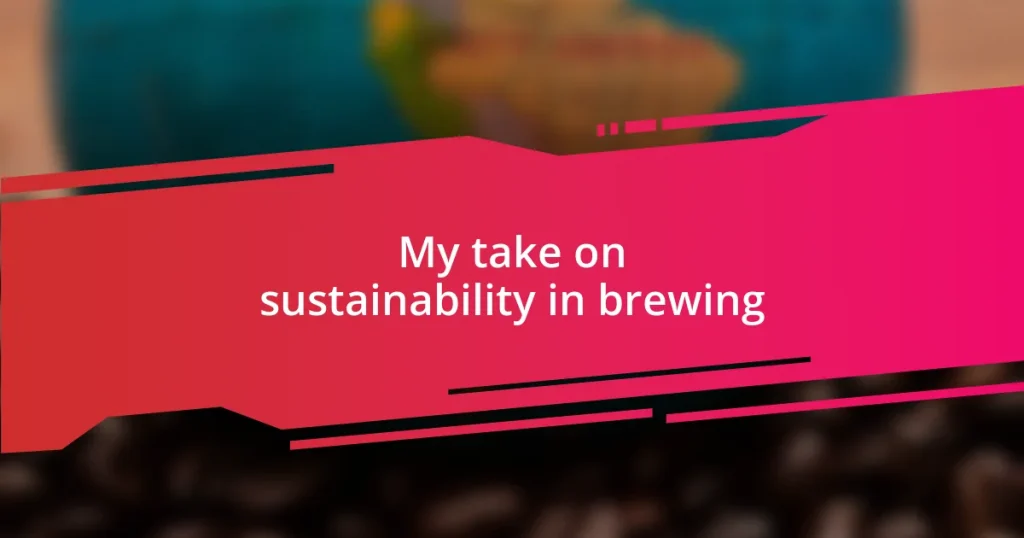Key takeaways:
- Sustainability in brewing involves eco-friendly practices, including water conservation, energy efficiency, and waste management, which can inspire broader industry change.
- Sourcing sustainable ingredients, such as local and organic options, enhances beer quality and fosters community connections between brewers and local suppliers.
- Innovations like precision fermentation, upcycling ingredients, and biocomposite materials are revolutionizing sustainable brewing practices for a cleaner future.
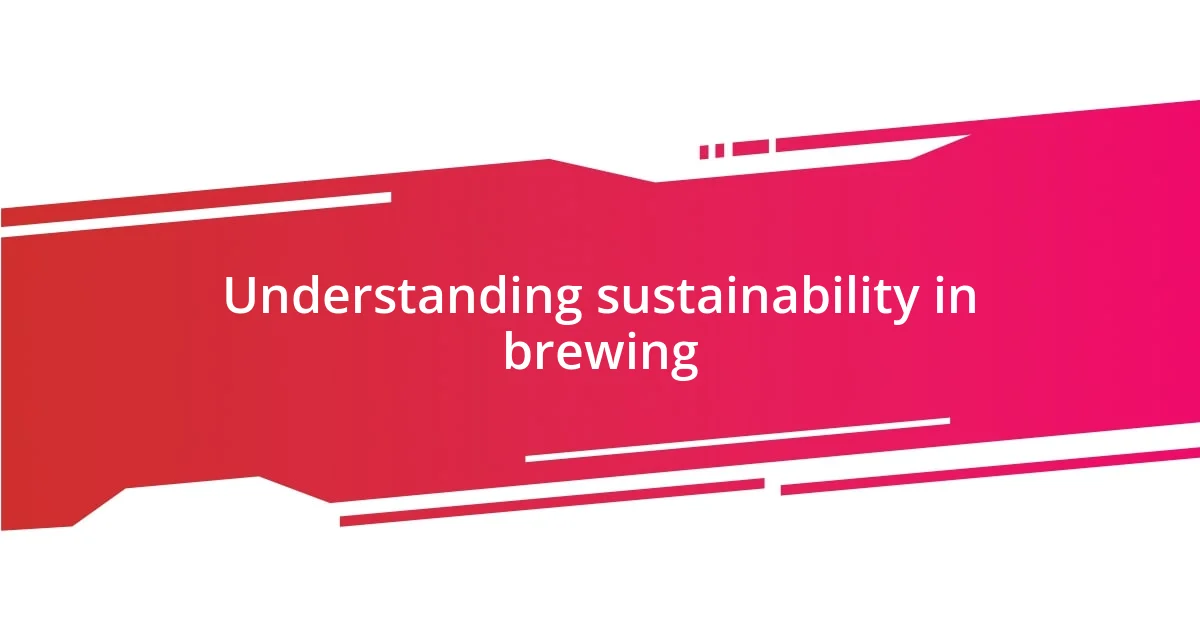
Understanding sustainability in brewing
Sustainability in brewing means more than just using eco-friendly ingredients; it encompasses the entire process, from sourcing materials to waste management. I remember visiting a local brewery where they repurposed spent grains for animal feed instead of discarding them. It struck me how small changes can ripple out into larger positive impacts on the environment.
One key aspect often overlooked is water usage. Brewing requires a significant amount of water, and I’ve seen breweries that have implemented clever systems to recycle this precious resource. Have you ever considered how much we take water for granted? Seeing a brewery that actively conserves water made me rethink my own habits at home and inspired me to reduce waste.
Finally, we should think about the energy we use. I’ve visited a few breweries that harness solar power, and it left me genuinely inspired. Isn’t it refreshing to see businesses investing in renewable energy? The passion these brewers have for not only crafting delicious beer but also promoting a healthier planet really resonates with me. It reminds us that sustainability in brewing can be a powerful driver for change in our communities.

Importance of eco-friendly practices
Eco-friendly practices in brewing are crucial for several reasons. I’ve often reflected on how our choices impact the planet. For instance, when breweries adopt sustainable methods, they not only reduce their environmental footprint but also inspire others in the industry to follow suit. I recall attending a beer festival where one brewery showcased their efforts to minimize packaging waste—talk about making a lasting impression! It’s these tangible actions that create a ripple effect, encouraging other brewers and even consumers to consider their own impact.
Moreover, these practices can enhance quality and flavor. I’ve tasted beers from breweries that source organic ingredients, and I can genuinely say there’s a noticeable difference. It’s incredible how eco-conscious farming translates directly into the product. Have you ever noticed how the environment affects taste? For me, each sip seems to carry the essence of sustainable farming. Emphasizing eco-friendly practices allows breweries to connect with consumers who desire quality and sustainability in their choices.
Lastly, it’s about community and the legacy we leave behind. I once volunteered for a brewery’s tree-planting event, which not only contributed to the environment but also fostered community bonds. When a brewery commits to sustainability, it’s contributing to the well-being of the local area. Imagine the positive impact if every brewery embraced eco-friendly practices—it’s a vision worth striving for.
| Eco-friendly Practices | Benefits |
|---|---|
| Waste Reduction | Minimizes landfill contributions and promotes recycling. |
| Water Conservation | Preserves a vital resource for future generations. |
| Energy Efficiency | Lowers production costs and dependence on non-renewable energy. |
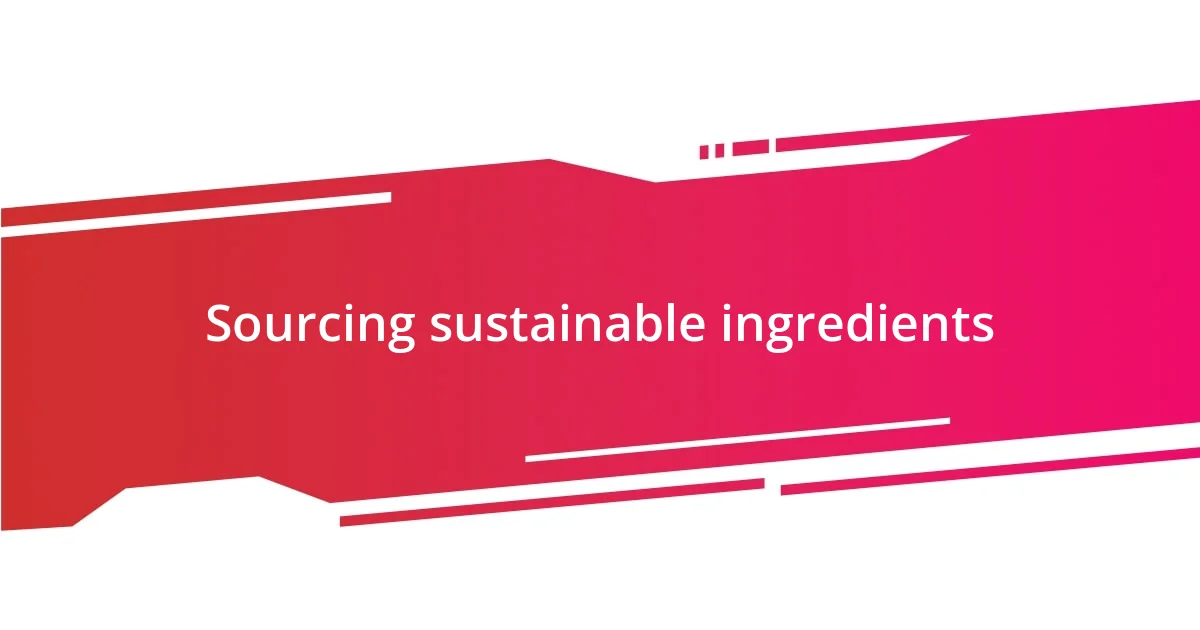
Sourcing sustainable ingredients
Sourcing sustainable ingredients is a cornerstone of eco-friendly brewing. In my experience, choosing local suppliers can dramatically reduce the carbon footprint associated with transportation. I’ve spoken with brewers who prioritize partnerships with nearby farms for their grains and hops, and listening to their passion is contagious. I remember one brewer who mentioned visiting a local farm to hand-pick some unique wheat varieties; the excitement in their voice made me realize that sustainable sourcing is not just a business decision—it’s a relationship with the land and community.
Here are some factors to consider when sourcing sustainable ingredients:
- Local sourcing: Reduces transportation emissions and supports local economies.
- Organic farming practices: Avoids synthetic pesticides and fertilizers, promoting healthier soil and ecosystems.
- Seasonal ingredients: Emphasizes freshness and reduces the ecological impact of long-term storage and transport.
- Diverse crop cultivation: Supports biodiversity and helps mitigate the risks associated with monoculture farming.
Engaging with sustainable ingredient sourcing can significantly elevate a brewery’s story. I once visited a brewery that was experimenting with wild yeast strains from their surrounding environment. Their commitment to harnessing local flavors truly connected them to their community and amplified the unique characteristics of their beverage. Every beer they crafted felt like a tribute to the land, and that authenticity made the tasting experience memorable. It stirred something in me, reinforcing the idea that sustainability isn’t just a trend; it’s a journey each brewer takes to forge a deeper link with their craft.
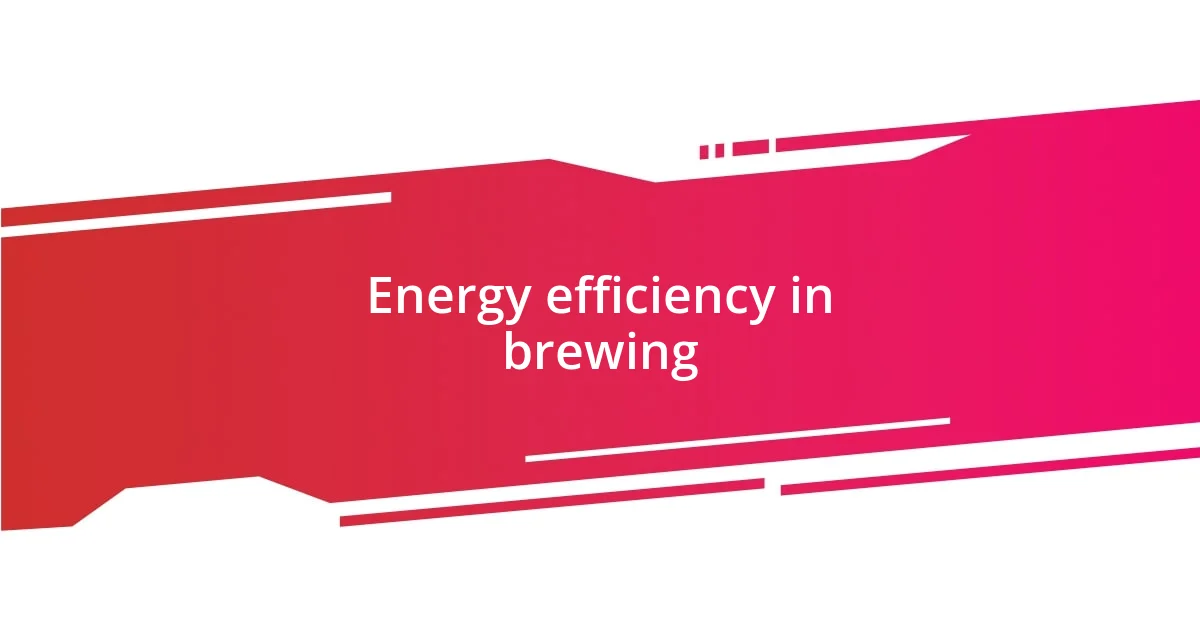
Energy efficiency in brewing
When it comes to energy efficiency in brewing, every step of the process counts. I remember touring a microbrewery that had invested in a heat recovery system. This ingenious setup captures excess heat from brewing and uses it to preheat water for the next batch. It was remarkable to see how a small change could lead to significant energy savings and lower operational costs. Have you ever considered how much energy is wasted in traditional brewing methods?
Using renewable energy sources is another game-changer for improving energy efficiency. I’ve talked to brewers who have installed solar panels on their rooftops, and they’re genuinely thrilled about it. One brewer shared how they generate enough solar power to cover nearly half of their energy needs. It’s inspiring to see how breweries can harness the sun’s energy, making their operations more sustainable while also reducing reliance on fossil fuels. It’s a win-win, isn’t it?
Finally, energy efficiency doesn’t just benefit the brewery; it can also create a unique selling point. I recall a discussion with a brewer who proudly boasted about their energy-saving initiatives. Their commitment to sustainability had even attracted eco-conscious customers who specifically sought out businesses that share their values. This intersection of quality product and responsible practices creates a compelling narrative that resonates with consumers today. What could be more attractive than enjoying a good beer, knowing it was brewed with the planet in mind?
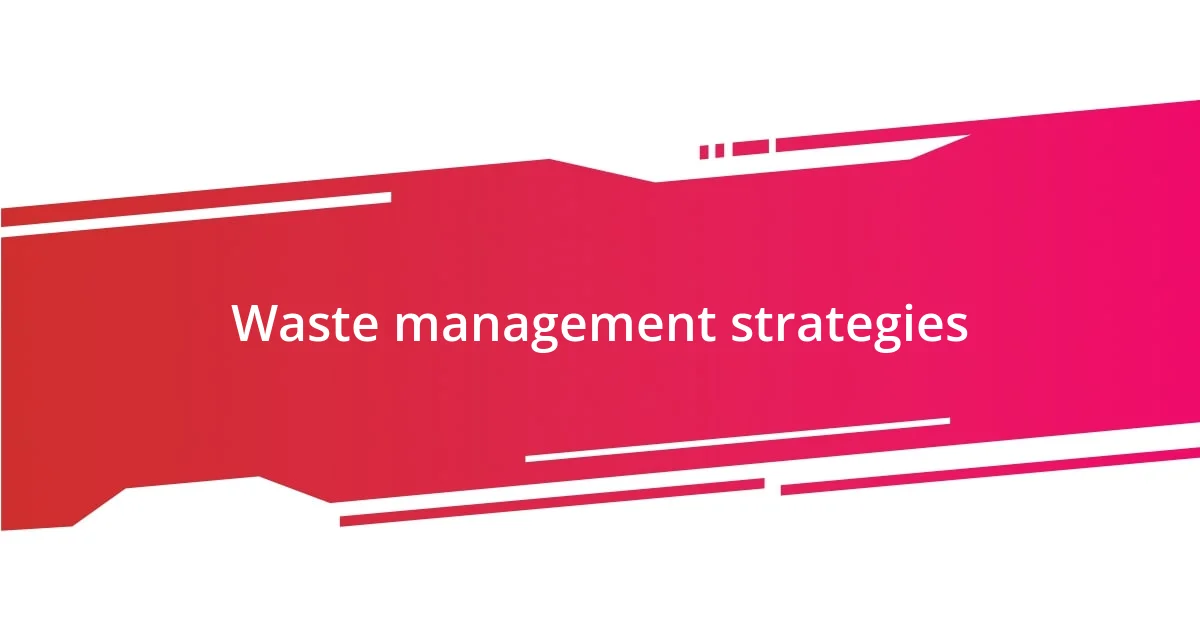
Waste management strategies
When I consider waste management strategies in brewing, I can’t help but think about how integral they are to a sustainable operation. A brewer I know implements an innovative composting system where spent grains are repurposed for local farms. It’s not just about reducing waste; it’s about creating a cycle that nourishes the earth and fosters community ties. Can you imagine the satisfaction of knowing that your waste is actually part of a larger ecosystem?
I’ve also encountered breweries that have adopted anaerobic digesters to manage organic waste. These systems convert leftovers into biogas, which can then be used to generate energy. Witnessing this first-hand left a lasting impression on me, as I saw how waste could transform into valuable resources rather than filling landfills. Doesn’t it make you rethink the concept of waste entirely?
Another striking approach I’ve observed involves reusing packaging materials. One brewery I visited diligently collects and sanitizes their bottles, significantly cutting down on new materials. The owner shared how their customers embraced this practice, creating a sense of camaraderie around sustainability. It’s beautiful how a simple initiative can create emotional connections and foster a culture of responsibility among consumers. Isn’t it inspiring to know that every bottle returned carries a story of commitment to the planet?
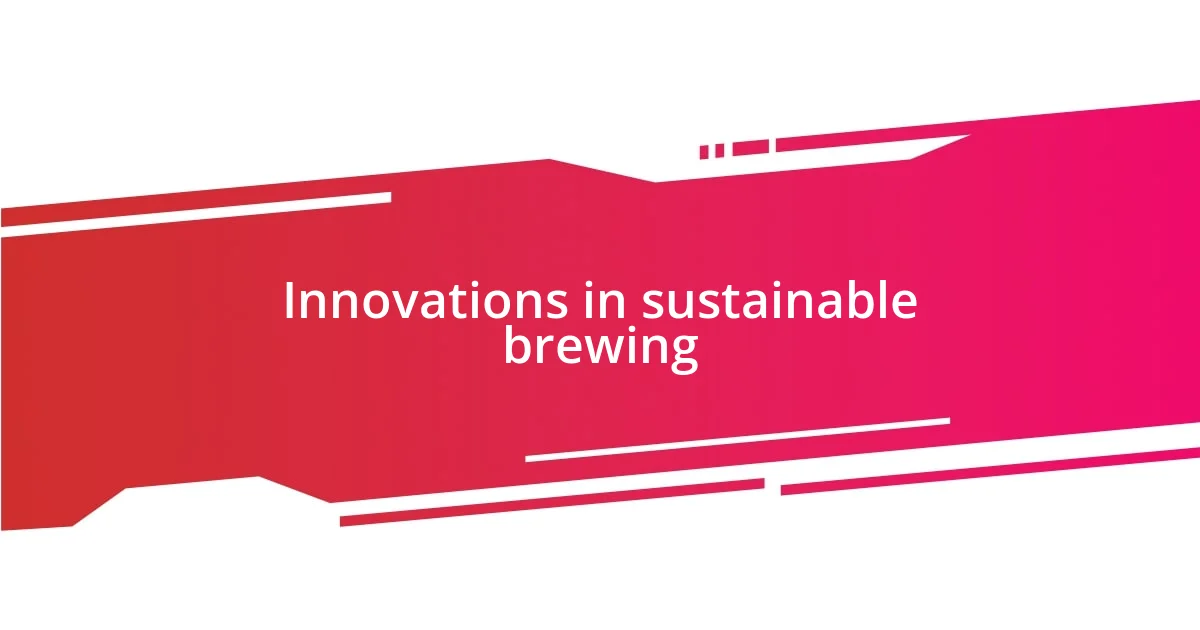
Innovations in sustainable brewing

Innovations in sustainable brewing
One of the most exciting innovations I’ve seen in sustainable brewing is the use of advanced fermentation technology. Last summer, I visited a brewery that had integrated a precision fermentation system. This technology allows brewers to optimize yeast performance, significantly cutting down on fermentation time and energy use. Can you imagine how liberating it must feel to speed up the process without sacrificing quality?
Another fascinating development is the concept of upcycling ingredients. I was so intrigued when a brewer I met started sourcing surplus bread from local bakeries to enhance their brews. It’s a creative way to reduce food waste while adding unique flavor profiles to their beers. I can still taste that crisp, refreshing note of toasted bread in their pale ale—what a delightful surprise! Have you ever thought about how innovative ingredient sourcing could change the brewing landscape?
Lastly, the emergence of biocomposite materials for brewing equipment caught my attention. I recently learned about a startup that’s developing mash tuns made from biodegradable composites. This shift not only reduces plastic use but also opens the doors for more environmentally friendly manufacturing processes. That’s about more than just brewing beer; it’s about revolutionizing the industry and inspiring others to think differently. Isn’t it incredible to see how innovations can lead to a more sustainable future for brewing?
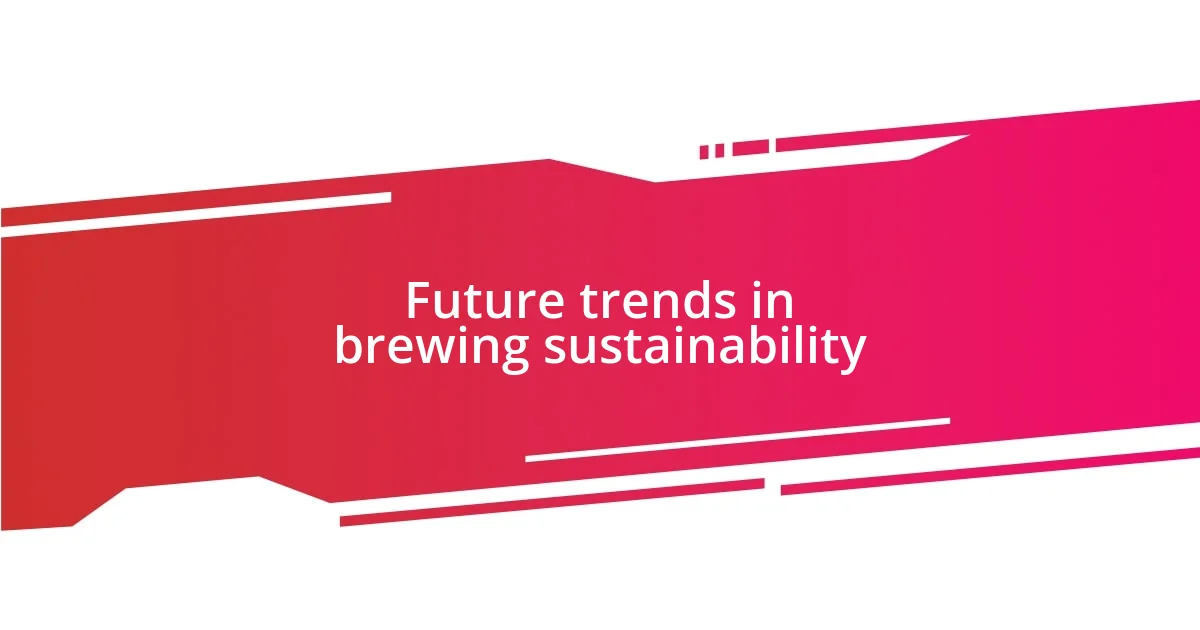
Future trends in brewing sustainability
I’ve been following the trend of energy efficiency in brewing, and it’s truly inspiring. Many breweries are turning to renewable energy sources, such as solar and wind, to power their operations. Just the other day, I read about a brewery that installed solar panels on their roof, allowing them to offset a significant portion of their energy consumption. Can you picture how empowering it must be for the team knowing they’re contributing to a cleaner environment with every brew they produce?
Water conservation strategies are also evolving. I sat down with a brewmaster who shared how they’ve adopted closed-loop water systems, which dramatically recycle water throughout the brewing process. It was fascinating to learn how they’ve reduced their water usage by over 60%! Isn’t it remarkable to think that a traditional industry like brewing can embrace modern practices to safeguard one of our most vital resources?
Lastly, I find the growing trend of transparency and traceability in sourcing ingredients particularly compelling. A friend of mine recently visited a brewery that proudly displays the history of their ingredients, from farm to glass. They even have QR codes on their packaging that lead consumers to detailed stories about their sourcing. Doesn’t that deepen the connection between the drinker and the craft? It’s not just about what’s in your glass; it’s about the journey it took to get there, enriching the drinking experience along the way.










